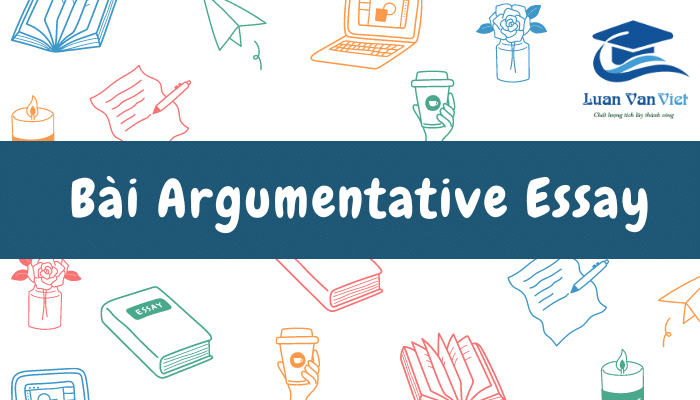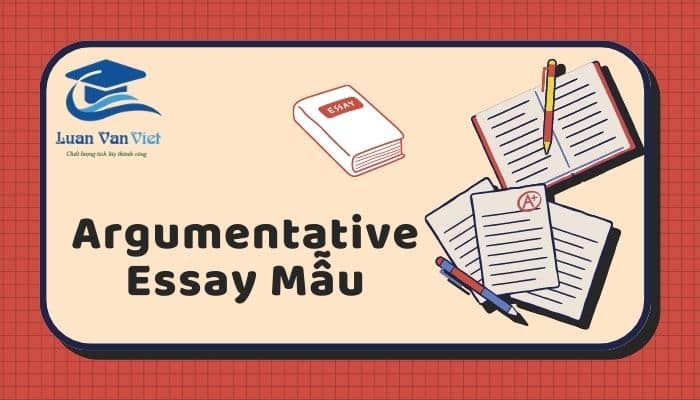Bạn đang tìm kiếm các bài mẫu Argumentative Essay để tham khảo cho bài viết của mình? Đừng bỏ lỡ cơ hội tải miễn phí 10 bài mẫu hoàn chỉnh với hơn 200 đề tài khác nhau trong bài viết này. Luận văn Việt sẽ giúp bạn nắm vững cấu trúc và cách thức lập luận cho từng dạng bài viết khác nhau. Hãy cùng khám phá và nâng cao khả năng viết của bạn!

Argumentative Essay là một loại bài viết mà người viết đưa ra một luận điểm cụ thể về một vấn đề và sử dụng bằng chứng và lý lẽ để thuyết phục độc giả về quan điểm của mình.
Mục tiêu chính của loại bài viết này là thuyết phục độc giả tin vào quan điểm mình thông qua việc trình bày lập luận logic và hợp lý.
Có 3 dạng bài argumentative essay chính:
- Dạng đồng tình: Ví dụ Lợi ích của việc học ngoại ngữ trong trường học
- Dạng không đồng tình: Phòng chống thuốc lá điện tử trong trường học
- Dạng trung lập: Tác động của mạng xã hội đối với cuộc sống cá nhân
- 1. Bài argumentative essay mẫu dạng đồng tình hay nhất
- 2. Bài argumentative essay mẫu dạng không đồng tình miễn phí
- 3. Bài argumentative essay mẫu trung lập xuất sắc
- 4. Bài argumentative essay mẫu đạt điểm cao
- 5. Bài argumentative essay mẫu ấn tượng nhất
- 6. Bài argumentative essay mẫu đặc sắc
- 7. Bài argumentative essay mẫu đặc biệt
- 8. Bài argumentative essay mẫu đáng tham khảo
- 9. Bài argumentative essay mẫu ấn tượng nhất
- 10. Bài argumentative essay mẫu đạt điểm cao
- 11. 200 đề tài argumentative essay hay nhất
1. Bài argumentative essay mẫu dạng đồng tình hay nhất
Topic: In the future, it seems more difficult to live on Earth. Some people think more money should be spent on researching another planet to live on, such as Mars. To what extent do you agree or disagree with this statement?
Cách viết:
- Xác định quan điểm mạch lạc: Đảm bảo quan điểm rõ ràng và dễ hiểu.
- Sử dụng bằng chứng thuyết phục: Hỗ trợ quan điểm bằng bằng chứng và ví dụ cụ thể.
- Tổ chức logic và câu chuyện mạch lạc: Xây dựng một cấu trúc văn bản có logic và mối liên kết giữa các ý.
2. Bài argumentative essay mẫu dạng không đồng tình miễn phí
Topic: Students in schools and universities learn more from their teachers than through other means such as the Internet, libraries, and TV. To what extent do you agree or disagree?
Gợi ý cách viết:
- Xác định quan điểm rõ ràng: Bạn đồng tình hoặc không đồng tình với tuyên bố ban đầu và đảm bảo quan điểm của bạn rõ ràng.
- So sánh vai trò của giáo viên và các nguồn học tập khác: Xem xét cách giáo viên và các phương tiện học tập trực tuyến, thư viện, và TV đóng vai trò trong việc học.
- Xây dựng lập luận mạch lạc: Xây dựng một lập luận mạch lạc bằng cách sử dụng logic và lý lẽ để ủng hộ quan điểm cá nhân và tổ chức bài viết thuyết phục.
3. Bài argumentative essay mẫu trung lập xuất sắc
Topic: It is impossible to help all people in the world, so governments should only focus on people in their own countries. To what extent do you agree or disagree?
Cách viết:
- Xác định quan điểm: Đảm bảo rằng bạn có một quan điểm rõ ràng về việc chính phủ nên tập trung vào người dân trong nước hoặc hỗ trợ quốc tế.
- Liệt kê lý do và bằng chứng: Thể hiện quan điểm bằng cách liệt kê lý do và bằng chứng cụ thể cho quan điểm của bạn.
- Xây dựng lập luận mạch lạc: Tổ chức bài viết sao cho lập luận của bạn có logic và mạch lạc, để đảm bảo rằng bạn thuyết phục độc giả.
4. Bài argumentative essay mẫu đạt điểm cao
Topic: Universities should accept equal numbers of male and female students in every subject. To what extent do you agree or disagree?
Cách viết bài đạt điểm cao:
- Tổ chức câu chuyện logic: Xây dựng một cấu trúc văn bản có logic, với mỗi đoạn có một ý chính rõ ràng và liên kết chặt chẽ với các đoạn khác.
- Kiểm tra lỗi và chỉnh sửa: Kiểm tra lỗi chính tả, ngữ pháp và cấu trúc câu để đảm bảo bài viết rõ ràng và chính xác.
- Thể hiện quan điểm cá nhân: Sử dụng câu từ và ngôn ngữ để thể hiện quan điểm cá nhân một cách rõ ràng và thú vị.
5. Bài argumentative essay mẫu ấn tượng nhất
Topic: Families who send their children to private schools should not be required to pay taxes that support the state education system. To what extent do you agree or disagree with this statement?
Tip viết bài:
- Xác định quan điểm mạch lạc: Để đạt điểm cao, bạn cần xác định một quan điểm rõ ràng về việc phụ huynh gửi con em mình đến trường tư thục có nên phải đóng thuế để hỗ trợ hệ thống giáo dục công hay không.
- Sử dụng lý lẽ và bằng chứng hợp lý: Để thuyết phục, hãy sử dụng lý lẽ và bằng chứng hợp lý để ủng hộ quan điểm của bạn hoặc bác bỏ quan điểm đối lập.
- Tổ chức bài viết mạch lạc: Bài viết cần có một cấu trúc rõ ràng, mỗi đoạn tập trung vào một ý chính và có sự liên kết logic giữa các đoạn.
6. Bài argumentative essay mẫu đặc sắc
Topic: Free Distance Learning Is The Way To Go. Do you agree or disagree?
Mẹo viết bài tốt nhất:
- Nắm rõ chủ đề và hiểu rõ đề bài: Đảm bảo bạn đã hiểu rõ chủ đề học từ xa miễn phí và đề bài.
- Liệt kê lý do và bằng chứng thuyết phục: Đưa ra các lý do và bằng chứng thuyết phục để ủng hộ quan điểm của bạn hoặc bác bỏ quan điểm đối lập. Sử dụng ví dụ và thông tin thống kê để minh họa.
7. Bài argumentative essay mẫu đặc biệt
Topic: Climate Change Argument Essay: It’s Happening And Fast. What extend do you agree or disagree?
Cách viết bài:
- Sử dụng lý lẽ và bằng chứng thuyết phục: Ủng hộ hoặc phản bác quan điểm của bạn bằng lý lẽ và bằng chứng khoa học.
- Phản biện lập luận đối phương: Xem xét và đối phó với quan điểm đối lập một cách có lý để thể hiện tính logic và phân tích.
8. Bài argumentative essay mẫu đáng tham khảo
Topic: Good Online Learning Research Paper Example. To what extent do you agree or disagree?
Cách viết bài ấn tượng:
- Xác định quan điểm rõ ràng: Đảm bảo bạn có một quan điểm rõ ràng về việc liệu ví dụ nghiên cứu về học trực tuyến là tốt hay không.
- Xây dựng lập luận mạch lạc: Xây dựng một cấu trúc văn bản rõ ràng, với mỗi đoạn tập trung vào một ý chính và có sự liên kết logic giữa các đoạn.
- Phản biện lập luận đối phương: Đối phó với quan điểm đối phương bằng cách phân tích và phản biện mạch lạc, thể hiện sự sâu sắc trong suy nghĩ của bạn.
9. Bài argumentative essay mẫu ấn tượng nhất
Topic: The most important function of music is that it helps people reduce stress. To what extent do you agree or disagree?
Cách viết bài chất lượng:
- Tổ chức bài luận: Xây dựng cấu trúc văn bản một cách hợp lý, với mỗi đoạn tập trung vào một điểm cụ thể và có sự liên kết logic giữa các đoạn.
- Sử dụng ngôn ngữ thuyết phục: Sử dụng ngôn ngữ thuyết phục và các công cụ tu từ để làm cho lập luận của bạn thuyết phục.
10. Bài argumentative essay mẫu đạt điểm cao
Topic: Students in schools and universities learn more from their teachers than through other means such as the Internet, libraries, and TV. To what extent do you agree or disagree?
3 nội dung nên có trong bài:
- So sánh vai trò của giáo viên và các phương tiện khác: Đánh giá vai trò của giáo viên và các nguồn học tập trực tuyến, thư viện và TV. Xem xét cách chúng đóng góp vào quá trình học của học sinh.
- Tổ chức bài luận: Xây dựng cấu trúc văn bản rõ ràng, với mỗi đoạn tập trung vào một điểm cụ thể và có sự liên kết logic giữa các đoạn.
- Sử dụng ngôn ngữ thuyết phục: Sử dụng ngôn ngữ thuyết phục và các công cụ tu từ để làm cho lập luận của bạn thuyết phục.

11. 200 đề tài argumentative essay hay nhất
Society and Culture:
- The impact of social media on personal lives.
- Pros and cons of smartphone usage in daily life.
- The positive and negative aspects of politically correct language.
- The influence of mass media on societal viewpoints.
- Should digitally altered images be banned in advertisements and magazines?
- Cancel culture and freedom of speech.
- The rise of online personas and their impact on personal and societal psychology.
- The effects of online violence on the behavior and psyche of children and teenagers.
- The right to personal choice and the abortion debate.
- The growth of the body positivity movement and its impact on beauty standards.
Science and Technology:
- The benefits and risks of artificial intelligence.
- The development of self-driving cars: potential and challenges.
- The effectiveness and impact of renewable energy usage.
- The Industry 4.0 revolution and its impact on employment.
- The significance of space tourism development.
- How science is contributing to increasing human lifespan.
- The impact of smart transportation technology on the environment and urban life.
- The healthcare revolution: benefits and challenges of telemedicine.
- The effects of the Internet of Things (IoT) on daily human life.
- E-sports and online gaming: should it be considered a legitimate sport?
Environment and Conservation:
- Necessary measures to mitigate global climate change.
- The impact of plastic pollution on the environment and human life.
- The benefits and limitations of nuclear energy in reducing CO2 emissions.
- The need to protect wilderness areas and natural reserves.
- The effects of mining and extraction on the environment.
- The green revolution: why and how we should transition to renewable energy.
- The trade-off between economic development and environmental protection.
- The effectiveness of measures to protect endangered species and wildlife.
- The impact of climate change on agriculture and food security.
- Green energy and the importance of utilizing renewable energy sources.
Politics and Society:
- Measures needed to ensure social justice.
- The rise of populism and its impact on global politics.
- The importance of gender equality and women’s rights in society.
- The effects of the surge in nationalism and the ban on slogans in politics.
- The phenomenon of fake news and its impact on information and voter decisions.
- The debate over freedom of speech and measures to control fake information online.
- Solutions to address the financial crisis and income inequality.
Health and Medicine:
- The pros and cons of universal healthcare systems.
- The role of genetic engineering in improving human health.
- The ethics of using animals for medical research.
- The rise of mental health awareness and its impact on society.
- Vaccination mandates: public health vs. individual rights.
- The benefits and drawbacks of telemedicine and online healthcare services.
- The impact of pharmaceutical companies on healthcare policies and access.
- The opioid crisis: causes, solutions, and responsibility.
- The role of alternative medicine in modern healthcare.
- Should the government regulate sugar and junk food consumption to combat obesity?
Education and Learning:
- The benefits and drawbacks of standardized testing in education.
- The role of technology in transforming traditional education.
- The pros and cons of homeschooling versus traditional schooling.
- The importance of arts and humanities education in the modern world.
- The impact of student loan debt on higher education choices and outcomes.
- The debate over single-sex education and its implications.
- The effectiveness of online learning platforms and MOOCs.
- Should colleges and universities consider applicants’ social media profiles in the admission process?
- The value of vocational and technical education in preparing students for the workforce.
- The role of teachers in shaping students’ perspectives and values.
Ethics and Morality:
- The moral implications of genetic cloning and engineering.
- The ethics of using animals for food and scientific research.
- The death penalty: should it be abolished or maintained?
- The balance between individual privacy and national security in surveillance.
- The morality of assisted suicide and euthanasia.
- The ethical considerations of organ transplantation and organ trading.
- The debate over the rights of animals and animal cruelty laws.
- The use of drones in warfare: ethical concerns and implications.
- The cultural relativism vs. universal human rights debate.
- The morality of capital punishment and its effectiveness as a deterrent.
Economy and Business:
- The impact of automation on the job market and economy.
- The pros and cons of a cashless society.
- Income inequality: causes, consequences, and potential solutions.
- The role of big corporations in influencing government policies.
- The gig economy: benefits and challenges for workers.
- The ethics of advertising to children and its influence on consumer behavior.
- The effects of globalization on local economies and cultures.
- The impact of cryptocurrency on traditional financial systems.
- Should CEOs’ salaries be capped to address income inequality?
- The role of the government in regulating monopolies and promoting competition.
Arts and Media:
- The influence of media violence on real-life aggression.
- The impact of streaming platforms on traditional cinema and television.
- Censorship in art and media: where to draw the line?
- The portrayal of gender and stereotypes in advertising and media.
- The effects of celebrity culture on society and individual behavior.
- The role of art and culture in fostering social change and awareness.
- Should governments fund and support the arts?
- The debate over cultural appropriation and its effects on marginalized communities.
- The impact of digital piracy on the entertainment industry.
- The responsibility of media outlets in presenting accurate and unbiased information.
Personal Development and Well-being:
- The importance of cultivating emotional intelligence.
- The benefits of mindfulness and meditation for mental health.
- The impact of social comparison and envy on well-being.
- The role of hobbies and leisure activities in maintaining a balanced life.
- The connection between physical health and mental well-being.
- The benefits of positive psychology in enhancing individual happiness.
- The effects of consumerism and materialism on personal satisfaction.
- The role of gratitude in promoting well-being and happiness.
- The challenges and benefits of work-life balance.
- The impact of social support networks on mental and emotional health.
Global Issues (continued):
- The impact of artificial intelligence on global job displacement and inequality.
- The role of international organizations in promoting world peace and security.
- The challenges and opportunities of addressing the global water scarcity issue.
- The ethical considerations of military interventions in foreign conflicts.
- The role of the media in shaping public perception of global conflicts and crises.
- The effects of urbanization on rural communities and agricultural practices.
- The importance of international cooperation in combating infectious diseases.
- The role of diplomacy in resolving international disputes and conflicts.
- The responsibility of developed countries in addressing global poverty and inequality.
- The implications of climate refugees and their legal rights in international law.
Legal and Justice Issues:
- The debate over the legality and ethics of autonomous weapons.
- The effectiveness of the criminal justice system in preventing and rehabilitating criminals.
- The role of restorative justice in addressing criminal offenses.
- The ethics of surveillance and privacy in the digital age.
- The pros and cons of mandatory minimum sentencing in criminal cases.
- The impact of technology on policing and law enforcement.
- The debate over the death penalty and its application in different countries.
- The challenges of combating cybercrime and protecting online security.
- The implications of legalizing recreational drugs on public health and safety.
- The responsibility of social media platforms in regulating hate speech and online harassment.
Philosophy and Ethics:
- The concept of free will vs. determinism in human decision-making.
- The ethics of whistleblowing: when is it justified to expose wrongdoing?
- The nature of morality: are moral values objective or subjective?
- The relationship between science and ethics in making moral decisions.
- The implications of the trolley problem in ethical reasoning.
- The role of empathy in ethical decision-making.
- The debate over animal rights and the ethics of animal testing.
- The ethical considerations of bioengineering and enhancing human abilities.
- The moral implications of technological advancements in cloning and genetic engineering.
- The concept of utilitarianism vs. deontology in ethical theories.
History and Memory:
- The importance of preserving historical monuments and sites.
- The debate over the removal of statues and symbols linked to controversial historical figures.
- The role of history education in shaping national identity and collective memory.
- The ethics of Holocaust denial and historical revisionism.
- The impact of colonialism on indigenous cultures and societies.
- The responsibility of governments in acknowledging and apologizing for historical atrocities.
- The role of museums and memorials in preserving historical memory.
- The effects of censorship and propaganda on historical narratives.
- The significance of oral history in preserving untold stories from the past.
- The role of historical truth and reconciliation commissions in addressing past injustices.
Education and Learning:
- The benefits and drawbacks of technology in the classroom.
- The role of standardized testing in assessing student knowledge and performance.
- The implications of online education on traditional classroom learning.
- The debate over bilingual education and its effects on language proficiency.
- The importance of teaching critical thinking skills in schools.
- The impact of gender-segregated education on gender stereotypes and equality.
- The role of teachers’ unions in advocating for educators’ rights and students’ welfare.
- The effectiveness of inclusive education in integrating students with disabilities.
- The challenges and benefits of homeschooling in the modern era.
- The impact of modern teaching methods on students’ creativity and engagement.
Media and Communication:
- The role of media literacy in combating fake news and misinformation.
- The impact of social media algorithms on shaping individual viewpoints.
- The responsibility of social media platforms in moderating hate speech and harmful content.
- The ethics of clickbait journalism and sensationalism in news reporting.
- The implications of deepfake technology on the credibility of visual media.
- The role of the media in promoting body image ideals and self-esteem.
- The effects of media representation on marginalized communities and stereotypes.
- The debate over the freedom of the press and national security concerns.
- The impact of media ownership and consolidation on media diversity and independence.
- The role of citizen journalism in holding institutions accountable and amplifying marginalized voices.
Social Issues:
- The implications of income inequality on social mobility and opportunities.
- The role of affirmative action in promoting diversity and addressing historical injustices.
- The impact of gentrification on low-income communities and urban development.
- The ethics of surrogacy and commercializing reproductive services.
- The challenges and benefits of implementing universal basic income.
- The implications of body modification and augmentation in societal beauty standards.
- The role of bystander intervention in preventing bullying and harassment.
- The impact of body shaming and appearance-related criticism on mental health.
- The debate over the rights and recognition of transgender individuals.
- The effects of ageism and discrimination against older adults in society.
Relationships and Family:
- The changing dynamics of traditional gender roles in modern relationships.
- The impact of technology on communication within families and relationships.
- The role of marriage in contemporary society: tradition vs. personal choice.
- The challenges and benefits of single-parent households.
- The implications of long-distance relationships in the digital age.
- The ethics of arranged marriages in different cultural contexts.
- The impact of divorce on children’s emotional and psychological well-being.
- The debate over parenting styles and their effects on child development.
- The role of government policies in supporting work-life balance and parental leave.
- The significance of fostering emotional intelligence and empathy within families.
Human Rights:
- The global fight against modern slavery and human trafficking.
- The importance of LGBTQ+ rights and acceptance in society.
- The implications of surveillance and government intrusion on individual privacy rights.
- The role of international organizations in protecting refugee rights and asylum seekers.
- The ethics of cultural relativism vs. universal human rights.
- The responsibility of businesses in ensuring fair labor practices and workers’ rights.
- The challenges and benefits of promoting indigenous rights and autonomy.
- The debate over the death penalty and its compliance with human rights standards.
- The impact of gender-based violence on women’s rights and safety.
- The significance of religious freedom and its limitations in multicultural societies.
Health and Wellness:
- The ethics of genetic testing and personalized medicine.
- The impact of social media on mental health and self-esteem.
- The role of diet and nutrition in preventing chronic diseases.
- The implications of pharmaceutical companies’ influence on medical research and policies.
- The benefits and drawbacks of alternative medicine and complementary therapies.
- The ethics of organ transplantation and organ trading.
- The impact of advertising and media on body image and self-esteem.
- The role of exercise and physical activity in maintaining overall well-being.
- The challenges and benefits of addressing mental health stigma in society.
- The debate over vaccination mandates and individual rights.
Tham khảo các bài mẫu Argumentative Essay là một phần quan trọng trong quá trình viết bài, giúp bạn hiểu rõ cấu trúc và cách thức trình bày ý.Luận văn Việt đã giới thiệu cho bạn 12 bài mẫu hoàn chỉnh, chia thành 3 dạng khác nhau: đồng tình, không đồng tình và trung lập. Hãy tải miễn phí những bài mẫu này để nắm vững và áp dụng cho bài viết của bạn, từ đó tạo ra những bài viết thuyết phục và chất lượng.
CEO Helen Lưu Hà Chi – Nhà sáng lập website luanvanviet.com , nơi cung cấp các dịch vụ viết thuê luận văn thạc sĩ, tốt nghiệp, tiểu luận, essay, Assignment, cùng với các giải pháp chuyên sâu về xử lý số liệu bao gồm SPSS, STATA, EVIEWS, và SmartPLS.









